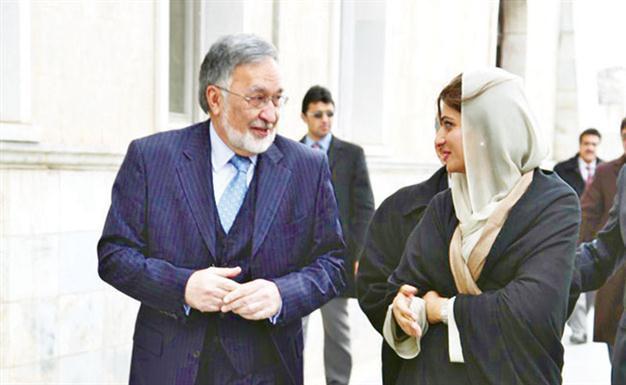NATO leaks overshadow Kabul, Islamabad parley

Pakistani Foreign Minister Khar (R) talks with her Afghan counterpart Rasool prior to a meeting with Afghan President Karzai in Kabul yesterday. Kahr said Pakistan has no hidden agenda in Afghanistan, referring to a recent secret NATO report. AFP photo
Pakistan’s security services were secretly aiding Afghanistan’s Taliban, who assume their victory is inevitable once Western troops leave, a secret NATO document revealed, news reports said yesterday.The leaked report – viewed by The Times newspaper and BBC – was compiled from information gleaned from insurgent detainees and was given to NATO commanders in Afghanistan last month, the media reports said. The State of the Taliban document claimed Islamabad, via Pakistan’s ISI intelligence agency, was “intimately involved” with the insurgency.
The BBC said the report was based on material from 27,000 interrogations of more than 4,000 captured Taliban and al-Qaeda operatives. “Pakistan’s manipulation of the Taliban senior leadership continues unabatedly,” the report was quoted as saying.
Jimmie Cummings, a spokesman for the NATO-led International Security Assistance Force (ISAF), confirmed the document’s existence but said it was not a strategic assessment of operations. “The classified document in question is a compilation of Taliban detainee opinions. It’s not an analysis, nor is it meant to be considered an analysis,” he said.
Pakistan aware of Taliban activities
“The government of Pakistan remains intimately involved with the Taliban,” the report said. “ISI is thoroughly aware of Taliban activities and the whereabouts of senior Taliban personnel. Senior Taliban leaders meet regularly with ISI personnel, who advise on strategy and relay any pertinent concerns of the government of Pakistan,” it added.
“ISI officers tout the need for continued jihad and expulsion of foreign invaders from Afghanistan,” the report said. However, there was little evidence from the detainees that Islamabad was providing funding or weaponry. The Times quoted the report as saying the Taliban’s “strength, motivation, funding and tactical proficiency remains intact,” despite setbacks in 2011. “Many Afghans are already bracing themselves for an eventual return of the Taliban,” the report said. “Once (NATO force) ISAF is no longer a factor, Taliban consider their victory inevitable.”
Pakistan lashed out yesterday at a leaked report, saying pre-dawn air strikes killed dozens of local Taliban fighters. “This is frivolous, to put it mildly. We are committed to non-interference in Afghanistan and expect all other states to strictly adhere to this principle,” Pakistani Foreign Ministry spokesman Abdul Basit told Agence France-Presse.
Later in the day, Pakistani Foreign Minister Hina Rabbani Khar said the report could be “disregarded.” “We can disregard this as a potentially strategic leak [...] This is old wine in an even older bottle,” she told reporters during an official visit to the Afghan capital Kabul.
Fierce fighting continues
The United States Department of Defense said it could not comment on the report but relayed its concern about Pakistan and its influence in Afghanistan. “We have not seen the report and therefore cannot offer comment on it specifically,” Pentagon spokesman George Little said. “We have long been concerned about ties between elements of the ISI and some extremist networks.”
U.S. Defense Secretary Leon Panetta “has also been clear that he believes that the safe havens in Pakistan remain a serious problem and need to be addressed by Pakistani authorities.” The report said there had been unprecedented interest in joining the Taliban cause in 2011 – even from members of the Afghan government. “Afghan civilians frequently prefer Taliban governance over the Afghan government, usually as a result of government corruption,” it was reported as saying. It said the Taliban was deliberately going soft in some areas to encourage NATO troops to leave faster, while doing local deals with the Afghan forces who take over.
Meanwhile, Pakistani fighter jets bombed militant hideouts in tribal areas near the Afghan border yesterday, officials said, capping two days of the fiercest fighting in weeks triggered by attacks by the Pakistani Taliban. Jets bombed two militant positions in the Jogi area of the Kurram tribal region, killing 12 Tehrik-e-Taliban Pakistan militants and six Uzbeks, Reuters reported. The jets then hit more militant positions in the nearby Mamozai area in the Orakzai tribal region, killing 20 militants and two senior commanders, officials said.
















